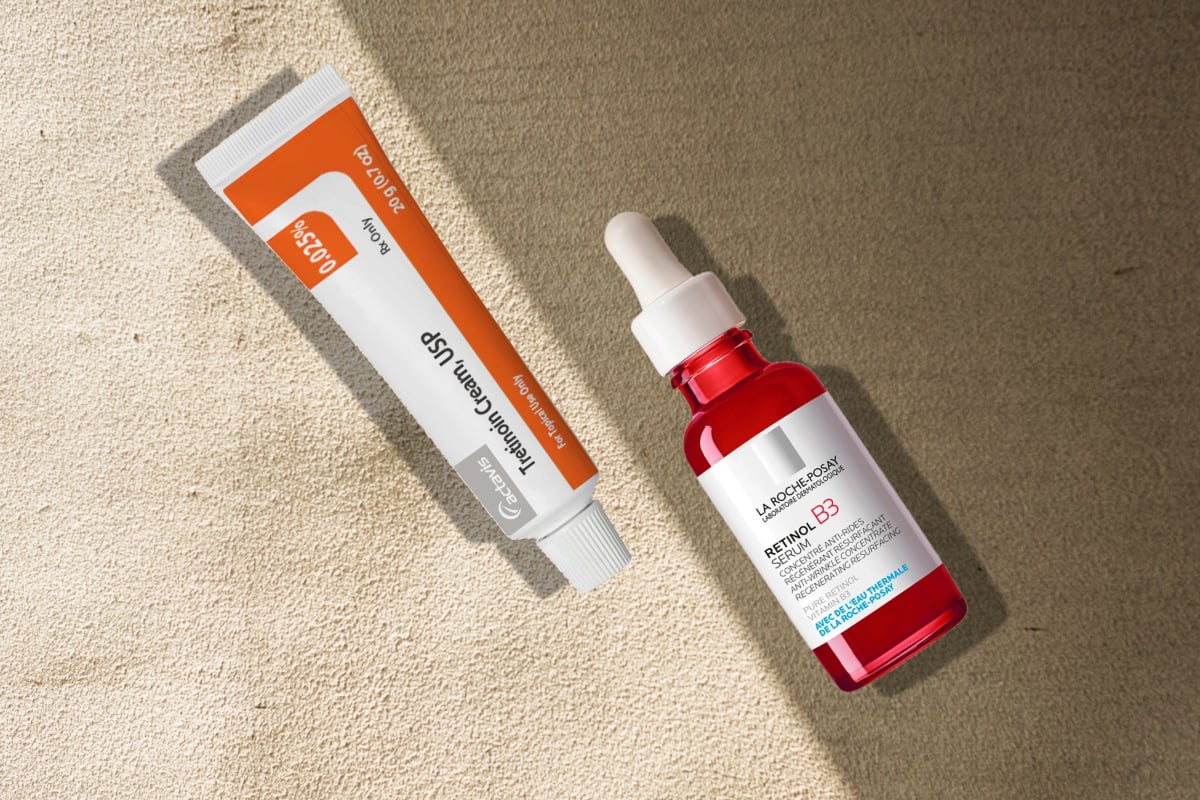Propolis is gentle, soothing, hydrating, and, believe it or not, might just be the ingredient your skin has been waiting for. So, let’s break it down: what is propolis, why is it suddenly everywhere in skincare, and could it be the answer to your skin prayers?
What is propolis?
Did you know that worker bees create a special substance to protect their home? This substance is called propolis or “bee glue”. Bees make propolis by combining plant resins (sticky substances from trees and plants) with beeswax and their own saliva, which is rich in enzymes. Why do bees do this? Well, propolis acts like a glue and a shield for their hive. It strengthens the structure of the hive and protects against unwanted guests like fungi, bacteria, and viruses. This makes their home safe.[1]
If we’re talking about skincare, this bee-made substance is full of properties that are good for our skin. Propolis is rich in vitamins, minerals, and enzymes. Among these are flavonoids (like quercetin) and phenolic acids. These are natural antioxidants that protect our skin from stuff like sun damage and premature aging.[1][2][3][4]
How propolis benefits the skin
According to studies, propolis in a concentration of 5-20% promotes faster healing of the skin, protects against sun damage, moisturizes the skin and treats various forms of acne. It also has brightening and anti-aging effects.
Accelerates skin healing
Propolis has been used for centuries in folk medicine to treat skin wounds and infections. It protects against bacterial infection, lessens swelling, and soothes pain, all of which makes the healing process more comfortable. Moreover, propolis boosts the body’s production of collagen, a special protein that’s required in the early stages of wound healing.[2][4][5][6]
Treats acne
Traditional acne treatments are becoming less effective because of growing antibiotic resistance. However, there’s promising news with propolis. Research shows that the ethanol extract of propolis can combat Cutibacterium acnes, a bacteria that often triggers acne. Propolis also contains caffeine, benzoic, and cinnamic acids, which appear to target and disrupt the bacteria’s membranes. Using propolis along with other natural antibacterial agents such as tea tree oil and aloe vera can work even better for treating acne and reducing blemishes.[2][8]
Moisturizes and soothes the skin
Propolis acts as a humectant, which means it can attract and retain moisture in the skin. When you put propolis on your skin, it hydrates and soothes the outer layer of skin, relieving everything from dry skin to tight skin.
Protects against UV damage
We all know that too much UV exposure is bad news for the skin. Not only can UV radiation cause painful sunburns, but it can also wreak havoc on the skin’s collagen fibers and lead to premature aging. The antioxidant, anti-inflammatory, and regenerative properties of propolis make it a soothing addition to sun blockers. The caffeic, coumaric and ferulic acids in propolis absorb UV light and add a natural barrier against sun damage, while the flavonoids recover skin from sun-induced damage.[2][7][9]
Softens fine lines and wrinkles
Although no product can eradicate wrinkles, there is much we can do to slow skin aging and even soften existing wrinkles, such as turning to products that contain propolis. One study found that applying a propolis product for eight weeks can reduce the appearance of wrinkles and promote healthier skin. But how does propolis smooth fine lines? For the same reason it makes your skin heal faster: it’s rich in flavonoids that neutralize free radicals and stimulate the growth of skin-firming collagen.[2][5]
Brightens skin
Here’s a fact: propolis can brighten skin and reduce dark spots, although not as intensely as a vitamin C serum. Studies found that propolis targets the three main causes of skin discoloration: inflammation, free radical damage, and excess melanin production.[10] Propolis also inhibits the growth of a certain fungus that triggers melanin production and leads to dark patches on the skin.[11] In a clinical study, the propolis extracts from different bee species reduced pigment content in skin cells by about 79%.[10]
How safe is it?
In skincare formulations, a concentration of 5–20% propolis is considered safe for most. However, propolis contains numerous allergenic substances. If you have a history of allergic reactions, proceed with caution and do a patch test on your inner arm before applying propolis to your face.[1][2]
Another thing to have in mind is that the composition of propolis varies greatly depending on where it is extracted. For example, the caffeic acid esters in European propolis are often linked to allergic reactions but are not present in Brazilian green propolis.[3]
How to use
- As a moisturizer: Propolis can hydrate the skin without clogging the pores. You can look for moisturizers that contain propolis as an ingredient, or mix propolis powder with your favorite moisturizer and apply it to your face and neck.
- As a spot treatment: Propolis has antibacterial and anti-inflammatory properties that can help heal acne and reduce redness and swelling. You can dab a small amount of propolis extract or cream on the affected areas and leave it overnight, or use a propolis-infused sheet mask for a more intensive treatment.
- As a serum: You can use a propolis serum (like these) or essence after cleansing and toning your skin for extra protection and glow.
- As a facial mask: Mix raw honey, propolis tincture, and royal jelly in a small bow. Then, apply the mixture to your clean and dry face, avoiding the eye area. Leave it on for 15 to 20 minutes, then rinse it off with warm water.
- Mix with other ingredients: Propolis works well with most skincare actives. For instance, use propolis with retinol for a more potent anti-aging treatment or with vitamin C to brighten dark spots and accelerate skin healing.
You can also take supplements with propolis. Studies found that supplementations with propolis can protect the skin against oxidative stress caused by free radicals, reduce wrinkles, stimulate the regeneration of skin tissue, and modulate collagen production. However, propolis supplements may also have some side effects, such as allergic reactions, bleeding problems, or interactions with certain medication
You ask, we answer
- Is propolis good for dark spots?
In addition to reducing free radical damage (one of the main factors that cause dark patches), propolis also inhibits melanin production. So yes, propolis is effective in reducing the appearance of dark spots, especially if you use it with other brightening ingredients like vitamin C and retinol.
- Is propolis good for fungal acne?
Propolis has antibacterial and antifungal properties that can work to inhibit the growth of fungi, which can relieve fungal acne.
- Does propolis help rosacea?
Thanks to its anti-inflammatory properties, propolis can help relieve redness and inflammation, which are often caused by rosacea.
- Can you use propolis every day?
There shouldn’t be a problem using products with propolis every day.
- Can I mix propolis and retinol?
There’s no problem with applying propolis and retinol as a part of your skincare routine. As a matter of fact, propolis can enhance the anti-aging effects and reduce the irritation and dryness caused by retinol.
- Can I mix propolis and vitamin C?
As both are antioxidants and pigment inhibitors, propolis and vitamin C work great together to brighten dark spots and other forms of discoloration.
- Can I use propolis with AHAs?
Using propolis and AHAs together shouldn’t be a problem, but to be safe, it’s best to do a patch test before going all-in with both.
- Can propolis cause itching and tingling?
Common skin reactions include itching, mild tingling, and even burning. However, that’s unlikely to happen if you use skincare products with propolis, as most are formulated with low concentrations of actives that shouldn’t bother the skin.
- Does propolis expire?
Studies show that propolis retains most of its properties even after 12 months. The shelf life of products containing propolis depends very much on their formulations. However, propolis works as a mild preservative due to its antioxidant and antimicrobial activities, so it actually extends the shelf life of some products.
Read next: 8 Best Propolis Serums To Try Right Now
Sources
Women’s Concepts uses reliable sources, including dermatologists’ insights, clinical trials, and scientific journals, to find accurate information and support all the facts shared in our articles. All statements and claims have clear and legit references. Read our editorial policy to learn more about our sources of information, our process of researching and fact-checking the content, and how our team strives to keep all articles updated, completed, and trustworthy.
- Hossain R, Quispe C, Khan RA, Saikat ASM, Ray P, Ongalbek D, Yeskaliyeva B, Jain D, Smeriglio A, Trombetta D, Kiani R, Kobarfard F, Mojgani N, Saffarian P, Ayatollahi SA, Sarkar C, Islam MT, Keriman D, Uçar A, Martorell M, Sureda A, Pintus G, Butnariu M, Sharifi-Rad J, Cho WC. Propolis: An update on its chemistry and pharmacological applications. Chin Med. 2022 Aug 26;17(1):100. doi: 10.1186/s13020-022-00651-2. PMID: 36028892; PMCID: PMC9412804.
- Kurek-Górecka A, Górecki M, Rzepecka-Stojko A, Balwierz R, Stojko J. Bee Products in Dermatology and Skin Care. Molecules. 2020 Jan 28;25(3):556. doi: 10.3390/molecules25030556. PMID: 32012913; PMCID: PMC7036894.
- Shiraishi E, Ishida K, Matsumaru D, Ido A, Hiromori Y, Nagase H, Nakanishi T. Evaluation of the Skin-Sensitizing Potential of Brazilian Green Propolis. Int J Mol Sci. 2021 Dec 17;22(24):13538. doi: 10.3390/ijms222413538. PMID: 34948335; PMCID: PMC8704603.
- Król W, Bankova V, Sforcin JM, Szliszka E, Czuba Z, Kuropatnicki AK. Propolis: properties, application, and its potential. Evid Based Complement Alternat Med. 2013;2013:807578. doi: 10.1155/2013/807578. Epub 2013 Aug 12. PMID: 23997799; PMCID: PMC3753737.
- An JY, Kim C, Park NR, Jung HS, Koo TS, Yuk SH, Lee EH, Cho SH. Clinical Anti-aging Efficacy of Propolis Polymeric Nanoparticles Prepared by a Temperature-induced Phase Transition Method. J Cosmet Dermatol. 2022 Sep;21(9):4060-4071. doi: 10.1111/jocd.14740. Epub 2022 Jan 9. PMID: 35001491.
- Rosa C, Bueno IL, Quaresma ACM, Longato GB. Healing Potential of Propolis in Skin Wounds Evidenced by Clinical Studies. Pharmaceuticals (Basel). 2022 Sep 14;15(9):1143. doi: 10.3390/ph15091143. PMID: 36145364; PMCID: PMC9504298.
- Kim DH, Auh JH, Oh J, Hong S, Choi S, Shin EJ, Woo SO, Lim TG, Byun S. Propolis Suppresses UV-Induced Photoaging in Human Skin through Directly Targeting Phosphoinositide 3-Kinase. Nutrients. 2020 Dec 10;12(12):3790. doi: 10.3390/nu12123790. PMID: 33322005; PMCID: PMC7764066.
- Mazzarello V, Donadu MG, Ferrari M, Piga G, Usai D, Zanetti S, Sotgiu MA. Treatment of acne with a combination of propolis, tea tree oil, and Aloe vera compared to erythromycin cream: two double-blind investigations. Clin Pharmacol. 2018 Dec 13;10:175-181. doi: 10.2147/CPAA.S180474. PMID: 30588129; PMCID: PMC6298394.
- Rivera-Yañez CR, Ruiz-Hurtado PA, Mendoza-Ramos MI, Reyes-Reali J, García-Romo GS, Pozo-Molina G, Reséndiz-Albor AA, Nieto-Yañez O, Méndez-Cruz AR, Méndez-Catalá CF, Rivera-Yañez N. Flavonoids Present in Propolis in the Battle against Photoaging and Psoriasis. Antioxidants (Basel). 2021 Dec 19;10(12):2014. doi: 10.3390/antiox10122014. PMID: 34943117; PMCID: PMC8698766.
- Arung ET, Syafrizal, Pasedan WF, et al. Prenylated Flavonoids as Antioxidant and Melanin Inhibitors From Stingless Bee (Wallacetrigona incisa) Propolis. Natural Product Communications. 2020;15(3). doi:10.1177/1934578X20911272
- Mamoon K, Thammasit P, Iadnut A, Kitidee K, Anukool U, Tragoolpua Y, Tragoolpua K. Unveiling the Properties of Thai Stingless Bee Propolis via Diminishing Cell Wall-Associated Cryptococcal Melanin and Enhancing the Fungicidal Activity of Macrophages. Antibiotics (Basel). 2020 Jul 17.




![Does resveratrol in red wine benefit your skin? While sipping on a glass of red wine can be a delightful experience, relying on it for skincare benefits is not the best idea. Sure, red wine contains a smidge of resveratrol, but let's put things into perspective. The concentration of resveratrol in red wine is relatively low. Red wines, specifically Pinot noir from France, typically contain 0.361-1.972 mg of resveratrol per liter.[8] To hit that reference dose of 500mg of resveratrol, you'd need to drink a lot of wine. We're talking about downing anywhere from 100 to 1000 glasses per day. It's a scene straight out of a wine lover's wildest dreams, but definitely not the healthiest approach. Resveratrol Benefits for Skin](https://womensconcepts.com/wp-content/uploads/2022/03/Resveratrol-Benefits-for-Skin.jpg)
